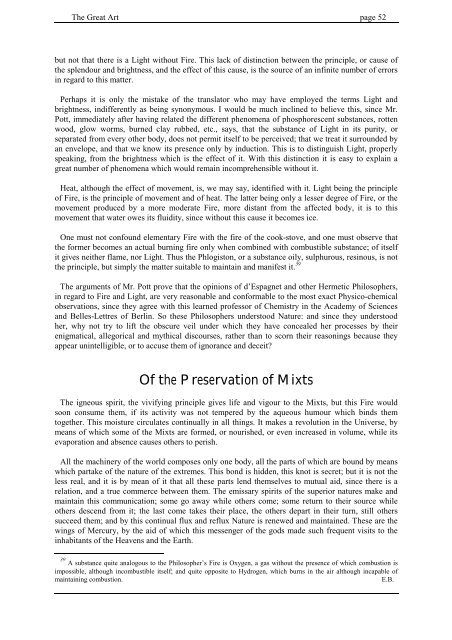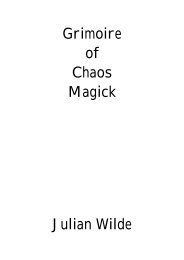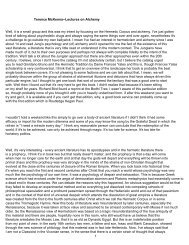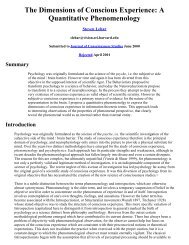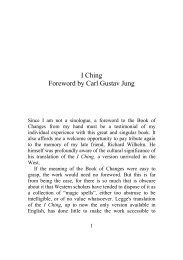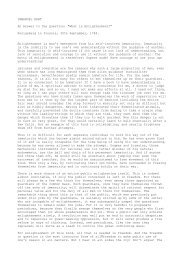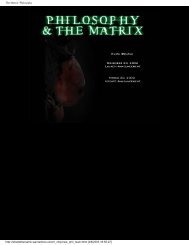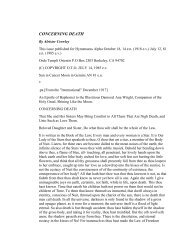Pernety - A Treatise On The Great Art.pdf - cyjack.com
Pernety - A Treatise On The Great Art.pdf - cyjack.com
Pernety - A Treatise On The Great Art.pdf - cyjack.com
Create successful ePaper yourself
Turn your PDF publications into a flip-book with our unique Google optimized e-Paper software.
<strong>The</strong> <strong>Great</strong> <strong>Art</strong> page 52but not that there is a Light without Fire. This lack of distinction between the principle, or cause ofthe splendour and brightness, and the effect of this cause, is the source of an infinite number of errorsin regard to this matter.Perhaps it is only the mistake of the translator who may have employed the terms Light andbrightness, indifferently as being synonymous. I would be much inclined to believe this, since Mr.Pott, immediately after having related the different phenomena of phosphorescent substances, rottenwood, glow worms, burned clay rubbed, etc., says, that the substance of Light in its purity, orseparated from every other body, does not permit itself to be perceived; that we treat it surrounded byan envelope, and that we know its presence only by induction. This is to distinguish Light, properlyspeaking, from the brightness which is the effect of it. With this distinction it is easy to explain agreat number of phenomena which would remain in<strong>com</strong>prehensible without it.Heat, although the effect of movement, is, we may say, identified with it. Light being the principleof Fire, is the principle of movement and of heat. <strong>The</strong> latter being only a lesser degree of Fire, or themovement produced by a more moderate Fire, more distant from the affected body, it is to thismovement that water owes its fluidity, since without this cause it be<strong>com</strong>es ice.<strong>On</strong>e must not confound elementary Fire with the fire of the cook-stove, and one must observe thatthe former be<strong>com</strong>es an actual burning fire only when <strong>com</strong>bined with <strong>com</strong>bustible substance; of itselfit gives neither flame, nor Light. Thus the Phlogiston, or a substance oily, sulphurous, resinous, is notthe principle, but simply the matter suitable to maintain and manifest it. 39<strong>The</strong> arguments of Mr. Pott prove that the opinions of d’Espagnet and other Hermetic Philosophers,in regard to Fire and Light, are very reasonable and conformable to the most exact Physico-chemicalobservations, since they agree with this learned professor of Chemistry in the Academy of Sciencesand Belles-Lettres of Berlin. So these Philosophers understood Nature: and since they understoodher, why not try to lift the obscure veil under which they have concealed her processes by theirenigmatical, allegorical and mythical discourses, rather than to scorn their reasonings because theyappear unintelligible, or to accuse them of ignorance and deceit?Of the Preservation of Mixts<strong>The</strong> igneous spirit, the vivifying principle gives life and vigour to the Mixts, but this Fire wouldsoon consume them, if its activity was not tempered by the aqueous humour which binds themtogether. This moisture circulates continually in all things. It makes a revolution in the Universe, bymeans of which some of the Mixts are formed, or nourished, or even increased in volume, while itsevaporation and absence causes others to perish.All the machinery of the world <strong>com</strong>poses only one body, all the parts of which are bound by meanswhich partake of the nature of the extremes. This bond is hidden, this knot is secret; but it is not theless real, and it is by mean of it that all these parts lend themselves to mutual aid, since there is arelation, and a true <strong>com</strong>merce between them. <strong>The</strong> emissary spirits of the superior natures make andmaintain this <strong>com</strong>munication; some go away while others <strong>com</strong>e; some return to their source whileothers descend from it; the last <strong>com</strong>e takes their place, the others depart in their turn, still otherssucceed them; and by this continual flux and reflux Nature is renewed and maintained. <strong>The</strong>se are thewings of Mercury, by the aid of which this messenger of the gods made such frequent visits to theinhabitants of the Heavens and the Earth.39 A substance quite analogous to the Philosopher’s Fire is Oxygen, a gas without the presence of which <strong>com</strong>bustion isimpossible, although in<strong>com</strong>bustible itself; and quite opposite to Hydrogen, which burns in the air although incapable ofmaintaining <strong>com</strong>bustion.E.B.


